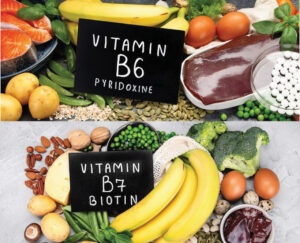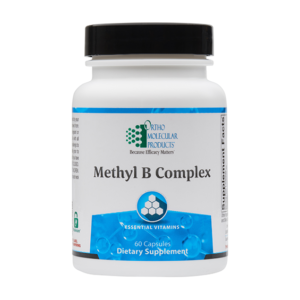Pyridoxine (B6) and Morning Sickness; Biotin (B7) and MS
We are finally ready to discuss the “last but not least” of the B vitamins. The past few weeks, we’ve learned that B vitamins can prevent heart disease, improve cognitive health, improve your immune system, lower cholesterol, prevent migraines, promote hair growth, and cure acne. Let’s look at a few important things pyridoxine (B6) and biotin (B7) can do for us.
Vitamin B-6 (Pyridoxine)
Vitamin B6 is a coenzyme that helps more than 100 enzymes perform various functions, including breakdown proteins, carbohydrates, and fats. It helps maintain normal levels of the amino acid homocysteine (high levels can cause heart problems). B6 also supports immune function and brain health.
Pyridoxine Deficiency Symptoms
- Depression
- Scaling and cracks in the lips and around the corners of the mouth
- Weakened immune function
- Inflammation
- Morning sickness

Why Might Deficiency Occur?
- Pregnancy (requires more B6)
- Kidney disease
- Crohn’s disease and colitis
- Long-term use of medications (especially oral contraceptives and NSAIDs)
- Heavy drinking (15 or more drinks a week for men; 8 or more drinks a week for women)
Deficiency usually occurs alongside low concentrations of other B vitamins such as B12 and folic acid (B9).
Sources of Pyridoxine
- Fish
- Beef liver
- Poultry
- Chickpeas
- Potatoes and other starchy vegetables
- Non-citrus fruits
Recommended Intake of Pyridoxine
Aim for about 2 mg/day. Long-term mega doses (1000 mg/day) may cause sensory neuropathy, characterized by numbness, pain, and difficulty walking.
B6 and Morning Sickness
Scientists have proven pyridoxine effectively treats the nausea and vomiting that 80% of all pregnant women experience. In a study of 59 pregnant women, half the group received 25 mg of B6 every eight hours for three days. At the end of the three days, the number of women who experienced vomiting in the treatment group reduced from 15 to 8.
Most prenatal vitamins contain enough B6 to meet the daily requirement of about 2 mg. Since blood levels of B vitamins decrease during pregnancy, a B6 supplement in addition to prenatal vitamins could help prevent or reduce the severity of morning sickness.
B6 and Inflammation
You normally have low levels of C-reactive protein (CRP), a protein your liver makes, in your blood. If your body’s level of inflammation increases, your liver responds by producing more CRP. Elevated CRP appears more often in people who eat less than 2 mg of B6 a day. We are starting to understand that B6 plays a key role in reducing inflammation, especially pro-inflammatory cytokines.
Vitamin B-7 (Biotin)
Biotin, also known as vitamin B7, plays a vital role in energy utilization. It helps turn the fats, carbohydrates, and proteins in the food you eat into the energy you need. We can’t make biotin from scratch, but our gut bacteria make it for us. Many foods in our diet contain biotin, and our bodies can even recycle the biotin we’ve already used for later.
Biotin Deficiency Symptoms
- Thinning hair
- Weak, brittle nails
- Rash around the eyes, nose, and mouth
- Seizures
Biotin deficiency rarely occurs in the United States.
Why Might Deficiency Occur?
- A rare genetic disorder call biotinidase deficiency. Standard newborn screening usually looks for this, and biotin supplementation effectively treats it.
- Too many raw egg whites. Raw egg whites contain avidin, which binds to biotin and reduces absorption. It takes a lot of raw eggs to cause a biotin deficiency.
- Dairy allergy. Studies have shown biotin deficiency commonly occurs in kids with milk allergies.
- Antibiotics can disrupt the bacteria that make biotin.
Sources of Biotin
- Meat
- Fish
- Eggs
- Dairy
- Vegetables such as sweet potatoes, spinach, and broccoli
Recommended Intake of Biotin
About 30 micrograms of biotin a day is sufficient for most adults. Pregnant women need more.
Hair, Nail and Skin Health
Marketers often promote supplements that contain biotin to improve the health of your hair, skin, and nails, but there’s not a lot of scientific evidence to support these claims. The research seems to indicate that biotin supplementation will improve hair and nail health for people with biotin deficiency, but not much evidence exists for biotin supplementation improving hair health in people without a deficiency. Researchers have found some evidence that biotin supplementation may improve nail strength.
High-Dose Biotin and Multiple Sclerosis
A pilot study in 2015 found that high-dose biotin (100-300 mg/day) might impact disability and progression in progressive multiple sclerosis. Four patients in the study with prominent visual impairment related to optical nerve injury showed significant improvement from the treatment. Sixteen patients with prominent spinal cord impairments showed significant improvement as well.
A 2021 meta-analysis of high-dose biotin for MS found a moderate certainty of evidence suggesting a potential benefit from high-dose biotin treatment for 12 to 15 months. This is great news considering very few treatments actually work to prevent or reverse the damage of MS.
B Vitamins Essential for Optimal Health
We’ve learned that the eight B vitamins all play an important role in hundreds of enzymatic interactions. They all help your body convert carbohydrates, fats, and protein to useable forms of energy. Scientists have also found that we can use many of them as natural cures for several disorders.
Keep in mind that a few key factors can cause vitamin B deficiencies. These most commonly include use of prescription medications, heavy drinking, pregnancy, and age. If you fit in any of these groups, you may want to consider taking a B complex vitamin on a regular basis.
Stay Strong,
Bo Railey


